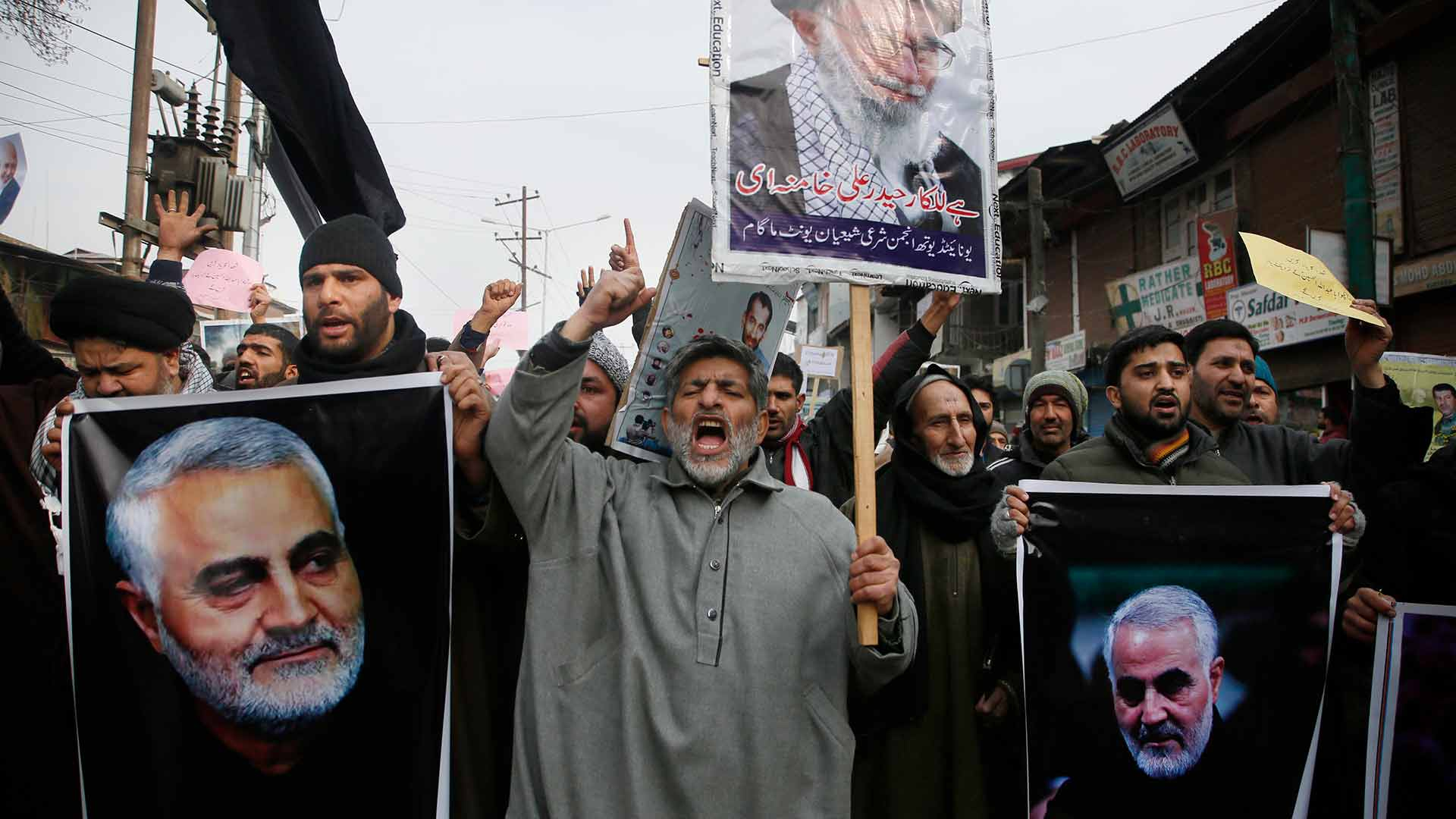
Kashmiri Shiite Muslims chant anti-America and anti-Israeli slogans during a protest against U.S. airstrike in Iraq that killed Iranian Revolutionary Guard Gen. Qassem Soleimani at Magam 37 kilometers North of Srinagar, Indian controlled Kashmir, Friday, Jan. 3, 2020. (AP Photo/Mukhtar Khan)
Kashmiri Shiite Muslims chant anti-America and anti-Israeli slogans during a protest against U.S. airstrike in Iraq that killed Iranian Revolutionary Guard Gen. Qassem Soleimani at Magam 37 kilometers North of Srinagar, Indian controlled Kashmir, Friday, Jan. 3, 2020. (AP Photo/Mukhtar Khan)
U.S. and Iran tension has escalated this week, unsettling the region and causing fear that more violence will come.
Here's a look at what led up to the recent violence.
Friday, December 27:
A rocket hits an Iraqi military base killing a U.S. contractor and wounding Iraqis and U.S. service members. The U.S. blame Kataib Hezbollah, a Iraqi militia group backed by Iran that the U.S. deems a terrorist group. Kataib Hezbollah denied responsibility for the attack.
Sunday, December 29:
The U.S. conducts airstrikes on five locations in Iraq and Syria against Kata'ib Hezbollah in retaliation. Iraqi security and militia sources said at least 25 fighters were killed and more than 55 were wounded.
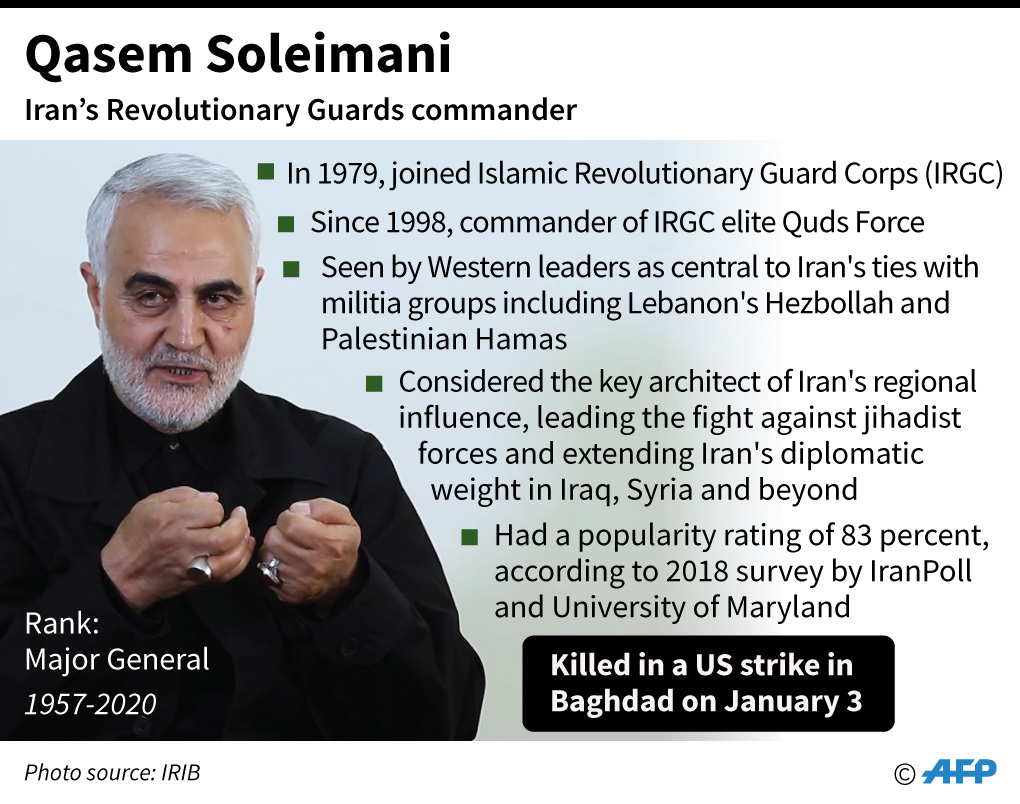
Tuesday, December 31:
The U.S. airstrikes cause discontent in Iraq. Thousands of Iraqi militia go to the U.S. Embassy compound in Baghdad in protest. A few breach the outer wall of the compound and set fire to a reception area. On the wall of the embassy, someone writes graffiti that said "Qasem Soleimani was here" referring to the commander of the Quds Force of the Islamic Revolutionary Guard.
U.S. security forces fire tear gas into the crowd. The embassy itself is unaffected and the militia disperse the following day when leaders said they would end the protest.
The mainly Shiite Muslim militia are part of the Iraqi security forces, but have a lot of autonomy. They have the support of Iran, a Shiite government. The militia had initially worked with the U.S. to defeat ISIL. But when ISIL was mostly quashed, the militia became more active in criticizing U.S. actions in Iraq and U.S. sanctions against Iran.
The White House blames the embassy attack on Iran. U.S. President Donald Trump tweets that Iran: “will be held fully responsible for lives lost, or damage incurred, at any of our facilities. They will pay a very BIG PRICE!"
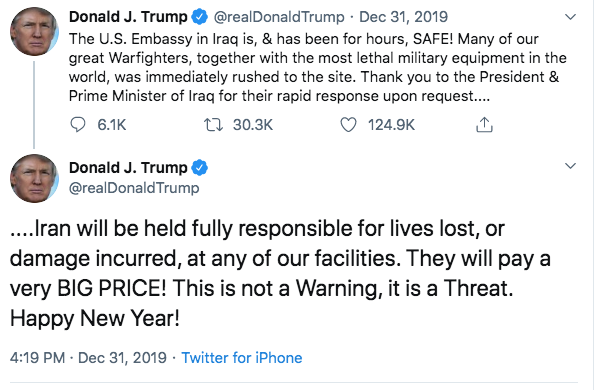
Wednesday, January 1:
Iranian Supreme Leader Ayatollah Ali Khamenei says in a statement in response to Trump: "Firstly, You can't do anything and secondly, If you were logical—which you're not—you'd see that your crimes in Iraq, Afghanistan... have made nations hate you."
Thursday, January 2:
U.S. Defense Secretary Mark T. Esper warns: “If we get word of attacks, we will take pre-emptive action as well to protect American forces, protect American lives. The game has changed.”
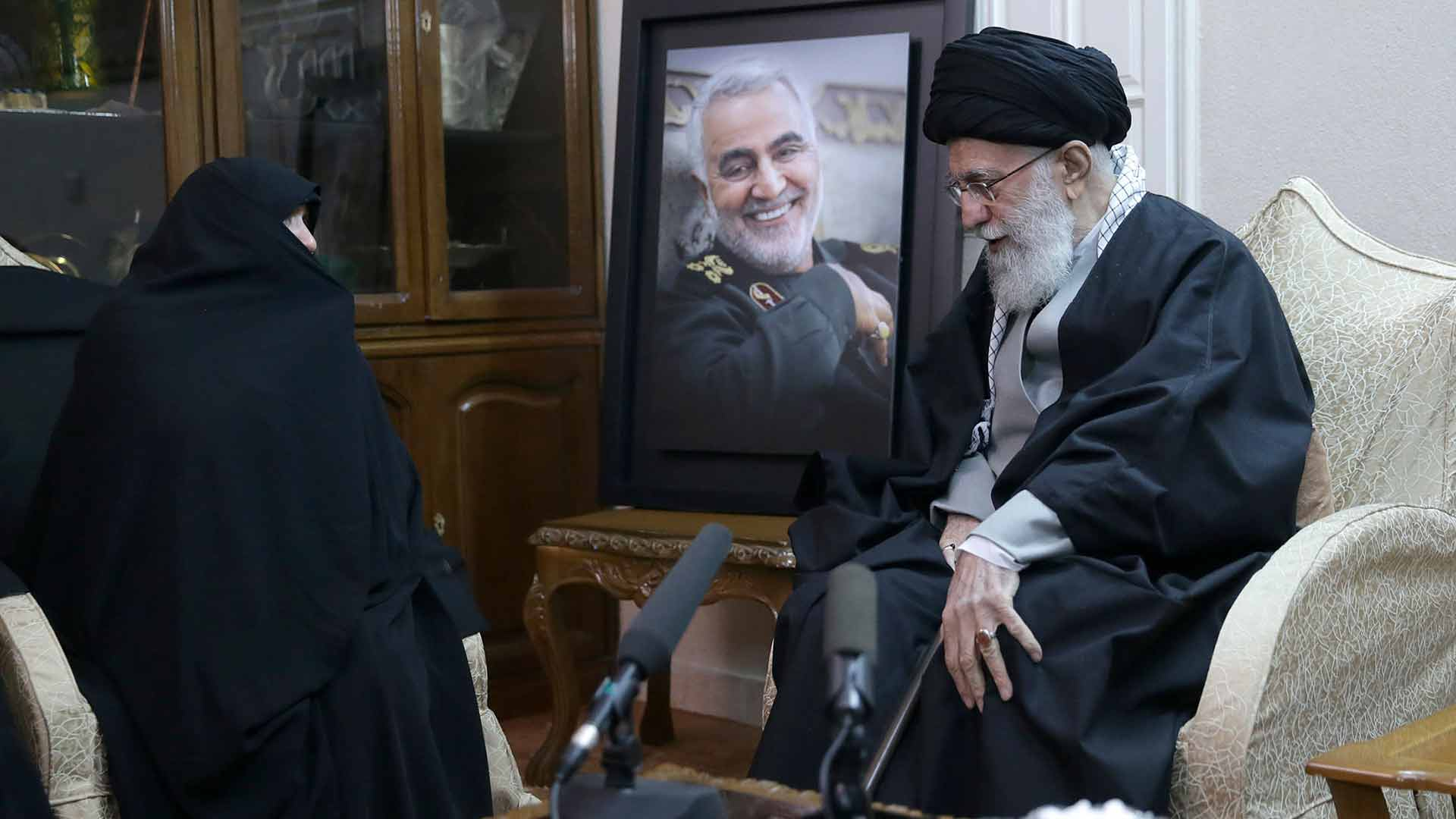
In this picture released by the official website of the office of the Iranian supreme leader, Supreme Leader Ayatollah Ali Khamenei, right, meets family of Iranian Revolutionary Guard Gen. Qassem Soleimani. (Office of the Iranian Supreme Leader via AP)
In this picture released by the official website of the office of the Iranian supreme leader, Supreme Leader Ayatollah Ali Khamenei, right, meets family of Iranian Revolutionary Guard Gen. Qassem Soleimani. (Office of the Iranian Supreme Leader via AP)
Friday, January 3:
Early Friday morning, a U.S. drone authorized by Trump hits a convoy of vehicles as it exits Baghdad International Airport. The strike kills Qasem Soleimani and other officials. Soleimani was the highest military and intelligence commander in Iran.
It is the strongest military action Trump has authorized in his presidency.
“For 23 years, he has been the equivalent of the J.S.O.C. commander, the C.I.A. director and Iran’s real foreign minister,” Mark Dubowitz, the chief executive of the Foundation for Defense of Democracies told the New York Times using an acronym for the United States’ Joint Special Operations Command. “He is irreplaceable and indispensable” to Iran’s military establishment.
The White House said the militias had hit Iraqi bases with U.S. service members 11 times in the last two months and that the drone strike was needed to prevent more attacks.
“General Suleimani was actively developing plans to attack American diplomats and service members in Iraq and throughout the region. General Soleimani and his Quds Force were responsible for the deaths of hundreds of American and coalition service members and the wounding of thousands more,” the Pentagon said in a statement.
In response, Ayatollah Ali Khamenei, issued a statement calling for three days of public mourning and then retaliation. Other Iranian officials have also vowed severe retaliation.
U.S. officials prepare for retaliatory attacks on the U.S. and its allies. This could possibly include cyberattacks and terrorism.
Critics of Trump say the strike could cause retaliations that could wreak havoc in the Middle East.
Senator Christopher S. Murphy tweeted: The question is this - as reports suggest, did America just assassinate, without any congressional authorization, the second most powerful person in Iran, knowingly setting off a potential massive regional war?
After the strike, Trump said war was not a good idea.
“I don’t think that would be a good idea for Iran. It wouldn’t last very long,” Trump said. “Do I want to? No. I want to have peace. I like peace.”
On Friday afternoon, the U.S. announced it will send 3,000 more Army troops to the Middle East as reinforcements and urged U.S. citizens to leave Iraq immediately.
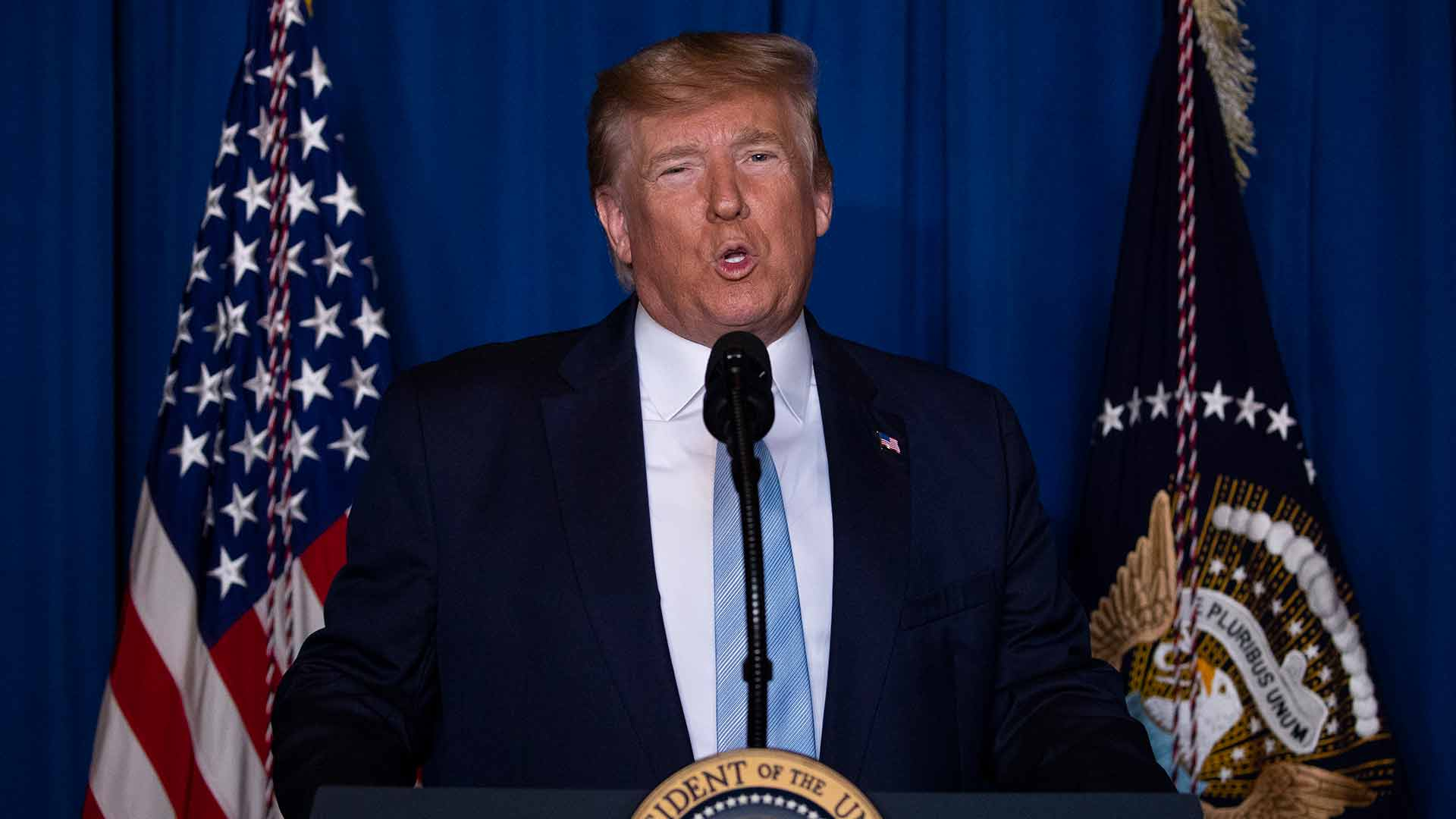
President Donald Trump delivers remarks on Iran, at his Mar-a-Lago property, Friday, Jan. 3, 2020, in Palm Beach, Fla. (AP Photo/ Evan Vucci)
President Donald Trump delivers remarks on Iran, at his Mar-a-Lago property, Friday, Jan. 3, 2020, in Palm Beach, Fla. (AP Photo/ Evan Vucci)
Saturday, January 4:
Iraq's parliament will meet for an emergency session while militias hold a funeral in Baghdad where thousands are expected. The targeted killing is likely to strengthen Iran-backed forces and political factions in the face of anti-government protesters who oppose Iranian influence. Iraq, which has maintained an uneasy alliance with both Washington and Tehran, will come under mounting pressure to expel the 5,200 American troops who are in the country to help prevent a resurgence of the Islamic State group. That would place Iraq even more firmly in Iran's camp, alongside Syria and Lebanon.
What's Next?
Iran could target U.S. troops in Iraq and Syria.
Iran could use its allies in Lebanon, Yemen or the Gaza Strip. The Iran-backed Hezbollah militant group dominates Lebanon and has an arsenal of tens of thousands of rockets that can hit every part of Israel.
Iran could also target U.S. allies in the Gulf and their oil infrastructure. The U.S. blamed Iran for a sophisticated attack on Saudi Arabia's oil facilities in September that temporarily halved its oil production. The U.S. also blamed Iran for the sabotage of oil tankers last year in the Strait of Hormuz, through which 20% of the world's oil passes. Iran denied those allegations, but acknowledged shooting down a U.S. surveillance drone in June.
Iran could also retaliate by abandoning the 2015 nuclear deal, which has gradually come unraveled since Trump withdrew from the agreement in May 2018 and restored crippling sanctions. Iran has already openly breached some of its commitments in response to the sanctions and could announce a major new drive to enrich uranium.
Iran could do nothing. Iran and its allies have lost several other senior commanders over the years. While they always vow revenge, they usually add that it will happen at a time and place of their choosing — and the crisis passes. For example, Hezbollah vowed revenge after one of its top commanders, Imad Mughniyeh, was killed in a bombing in Damascus that the group blamed on Israel. That was in 2008, and while the group has traded fire with Israel since then, it has not carried out any major attacks, no real precedent for the killing of a figure like Soleimani.
Joost Hiltermann, the Middle East program director at the Crisis Group, an international think tank, says “we could see a war.” “You could argue that it would be wise to do nothing and to let the storm pass,” he said. “But frankly, when you see Khamenei, the supreme leader, crying at the mourning ceremony... You realize that they have put themselves in a corner. They will have to respond.”
With input from AP
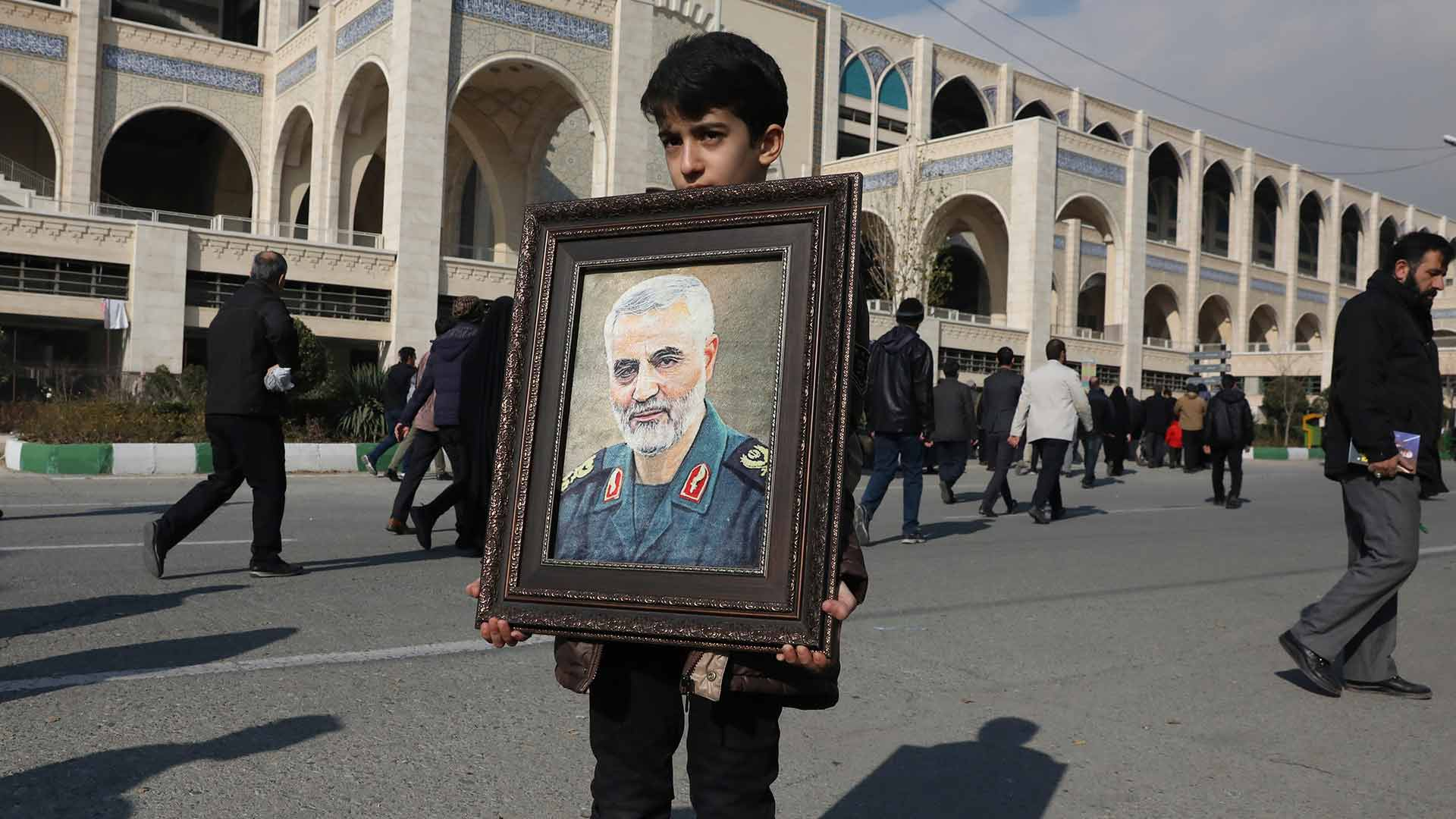
A boy carries a portrait of Iranian Revolutionary Guard Gen. Qassem Soleimani, who was killed in a U.S. airstrike in Iraq, prior to the Friday prayers in Tehran, Iran, Friday Jan. 3, 2020. Iran has vowed "harsh retaliation" for the U.S. airstrike near Baghdad's airport that killed Tehran's top general and the architect of its interventions across the Middle East, as tensions soared in the wake of the targeted killing. (AP Photo/Vahid Salemi)
A boy carries a portrait of Iranian Revolutionary Guard Gen. Qassem Soleimani, who was killed in a U.S. airstrike in Iraq, prior to the Friday prayers in Tehran, Iran, Friday Jan. 3, 2020. Iran has vowed "harsh retaliation" for the U.S. airstrike near Baghdad's airport that killed Tehran's top general and the architect of its interventions across the Middle East, as tensions soared in the wake of the targeted killing. (AP Photo/Vahid Salemi)